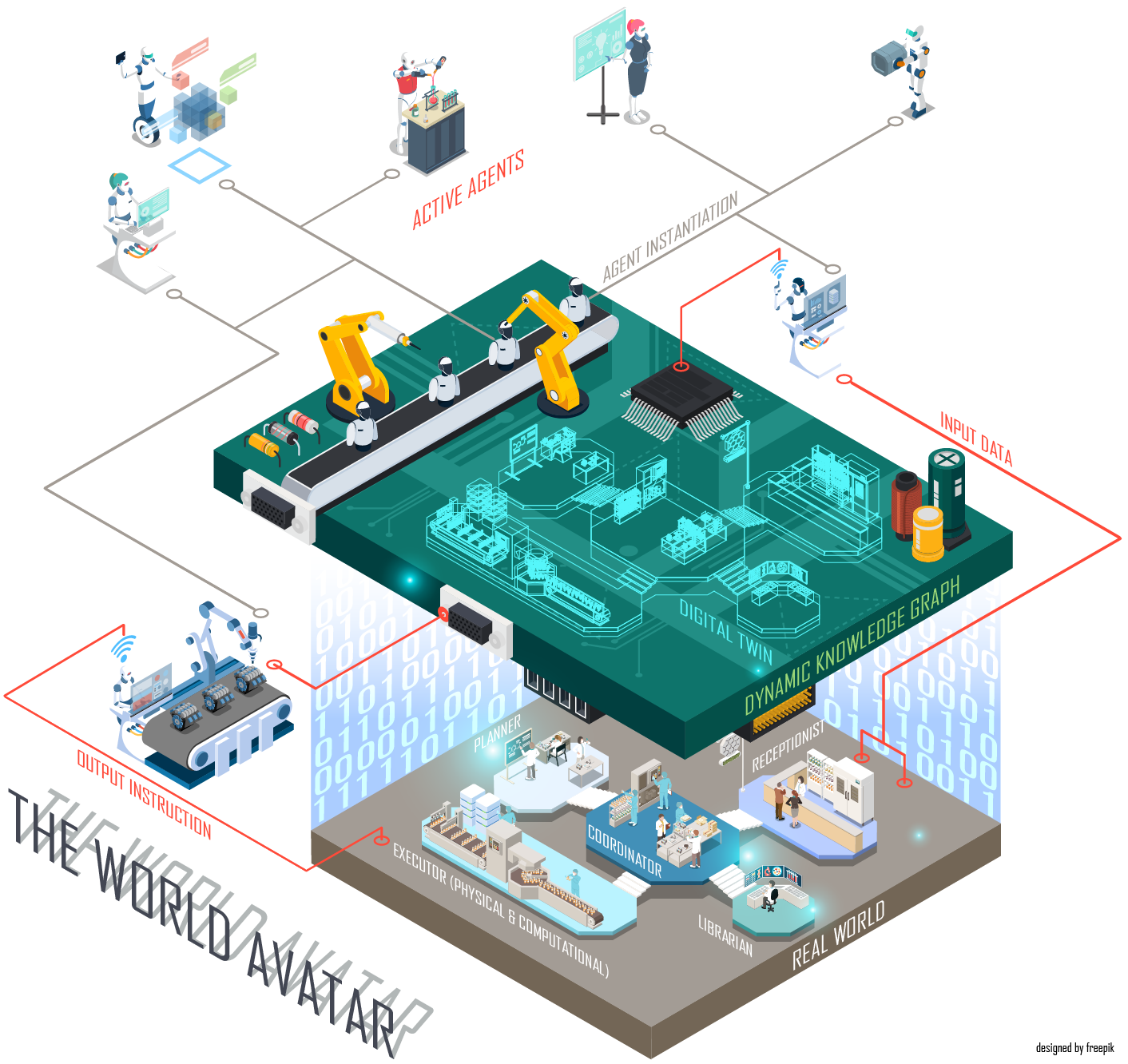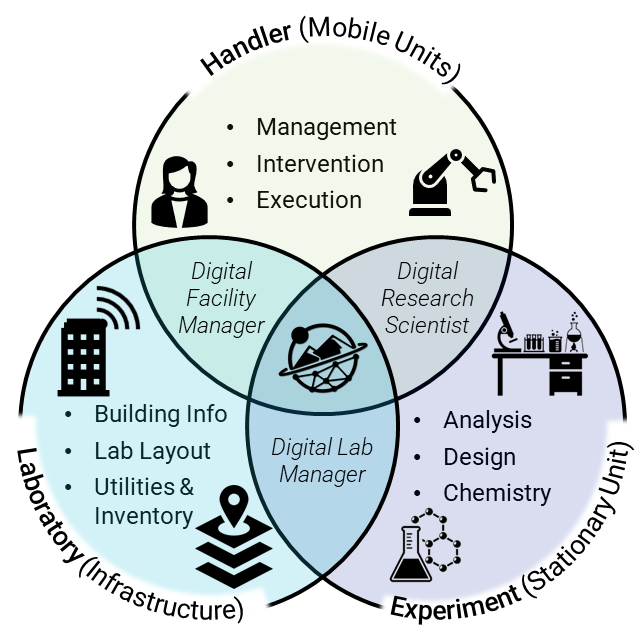
The Lab of the Future
The automation of experimental research activities plays a big role in accelerating scientific discovery - from ubiquitous software tools to “self-driving laboratories”. In order to achieve fully automated systems capable of conducting human-level scientific research, a plethora of challenges has to be overcome: while ensuring general interoperability and adaptability, providing orchestration of experiments and access to deep chemical knowledge, advanced capacities for reasoning and goal derivation need to be developed. We argue, that the current platform-centric approach is insufficient in this regard and might even limit further development. Our group therefore started developing solutions that are integrated within The World Avatar, an all-encompassing digital twin based on a dynamic knowledge graph.
The Digital Lab Framework
A change of perspective is needed to move the field from optimising few parameters within narrowly defined experimental setups to holistic lab automation that integrates all aspects of scientific laboratories and promises truly autonomous systems.
We therefore take on a systems engineering view that includes related knowledge about chemistry and error propagation as well as maintenance schedules, infrastructure, and utilities. We introduce the Digital Lab Framework as part of The World Avatar that aims to unify the capabilities of self-driving labs with electronic lab notebooks and inventory management systems as well as integrate information currently siloed in BIM, GIS, and BMS systems.

Previous Work
Our group has been working in this field since 2004, digitising and automating experimental research initially for educational purposes. Previous work has been conducted within the Weblabs project, offering remote control of real-life experiments as teaching methods.
Recent Associated Preprints
318: The Digital Lab Manager: Automating Research Support
Simon D. Rihm, Yong Ren Tan, Wilson Ang, Markus Hofmeister, Xinhong Deng, Michael Teguh Laksana, Hou Yee Quek, Jiaru Bai, Laura Pascazio, Sim Chun Siong, Jethro Akroyd, Sebastian Mosbach, and Markus Kraft, Technical Report 318, c4e-Preprint Series, Cambridge, 2024.
Simon D. Rihm, Yong Ren Tan, Wilson Ang, Hou Yee Quek, Xinhong Deng, Michael Teguh Laksana, Jethro Akroyd, Sebastian Mosbach, and Markus Kraft, Technical Report 316, c4e-Preprint Series, Cambridge, 2023.
314: The Digital Lab Framework as part of The World Avatar
Simon D. Rihm, Jiaru Bai, Aleksandar Kondinski, Sebastian Mosbach, Jethro Akroyd, and Markus Kraft, Technical Report 314, c4e-Preprint Series, Cambridge, 2023.
310: From Platform to Knowledge Graph: Distributed Self-Driving Laboratories
Jiaru Bai, Sebastian Mosbach, Connor J. Taylor, Dogancan Karan, Kok Foong Lee, Simon D. Rihm, Jethro Akroyd, Alexei A. Lapkin, and Markus Kraft, Technical Report 310, c4e-Preprint Series, Cambridge, 2023.
Recent Associated Publications
The digital lab manager: Automating research support
Simon D. Rihm, Yong Ren Tan, Wilson Ang, Markus Hofmeister, Xinhong Deng, Michael Teguh Laksana, Hou Yee Quek, Jiaru Bai, Laura Pascazio, Sim Chun Siong, Jethro Akroyd, Sebastian Mosbach, and Markus Kraft, SLAS Technology 29(3), 100135, (2024).
Transforming research laboratories with connected digital twins
Simon D. Rihm, Jiaru Bai, Aleksandar Kondinski, Sebastian Mosbach, Jethro Akroyd, and Markus Kraft, Nexus 1(1), 100004, (2024).
A dynamic knowledge graph approach to distributed self-driving laboratories
Jiaru Bai, Sebastian Mosbach, Connor J. Taylor, Dogancan Karan, Kok Foong Lee, Simon D. Rihm, Jethro Akroyd, Alexei A. Lapkin, and Markus Kraft, Nature Communications 15, 462, (2024).
Fully Automated Kinetic Models Extend our Understanding of Complex Reaction Mechanisms
Simon D. Rihm, Jiaru Bai, Laura Pascazio, and Markus Kraft, Chemie Ingenieur Technik 95(5), 740-748, (2023).
Funding
Funding has generously been provided by Cambridge-MIT Institute, Siemens SCE, and Pharma Innovation Programme Singapore (PIPS). This research was partly funded by the National Research Foundation (NRF), Prime Minister's Office, Singapore under its Campus for Research Excellence and Technological Enterprise (CREATE) programme.



